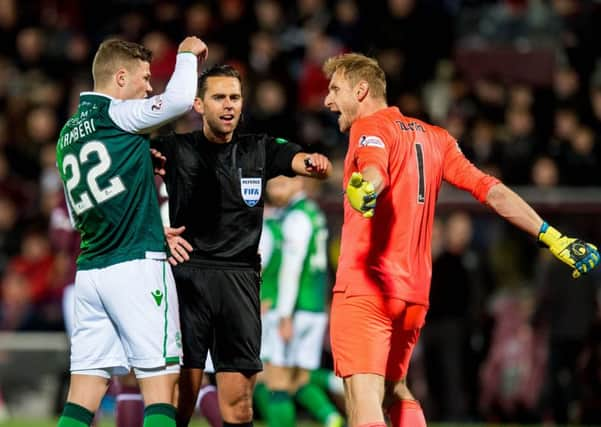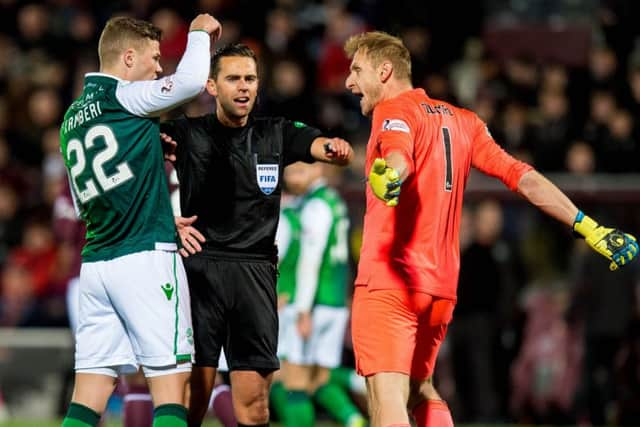The major football rule changes that will impact Hearts and Hibs next season


The International FA Board (The IFAB) met earlier this month in Aberdeen for their AGM where they outlined the amendments, including three which were approved following two years of experiments and consultation.
The changes and clarifications range from handball to over celebrating as The IFAB seek to give players, coaches and supporters greater clarity.
Handball
Advertisement
Hide AdAdvertisement
Hide Ad

The handball rule is one which provokes plenty of confusion and controversy. Now more situations have been outlined where handball should and should not be penalised.
A deliberate handball remains an offence, and now the following situations, even if accidental, will be a free kick:
• the ball goes into the goal after touching an attacking player’s hand/arm
• a player gains control/possession of the ball after it has touches their hand/arm and then scores, or creates a goal-scoring opportunity
• the ball touches a player’s hand/arm which has made their body unnaturally bigger
• the ball touches a player’s hand/arm when it is above their shoulder (unless the player has deliberately played the ball which then touches their hand/arm)
The following will not usually be a free kick, unless they are one of the above situations:
• the ball touches a player’s hand/arm directly from their own head/body/foot or the head/body/foot of another player who is near.
Advertisement
Hide AdAdvertisement
Hide Ad• the ball touches a player’s hand/arm which is close to their body and has not made their body unnaturally bigger
•if a player is falling and the ball touches their hand/arm when it is between their body and the ground to support the body (but not extended to make the body bigger)
•If the goalkeeper attempts to ‘clear’ (release into play) a throw-in or deliberate kick from a team-mate but the ‘clearance’ fails, the goalkeeper can then handle the ball.
Goal kick
One of the biggest changes is to the goal kick. No longer will the ball have to be played outside the box before it is deemed in play. Players from either side can touch the ball inside the box.
IFAB said: “The experiment that at a goal kick the ball is in play once it is kicked, and does not have to leave the penalty area, has created a faster and more dynamic/constructive restart to the game. It has reduced the time ‘lost/wasted’ including stopping the tactic of ‘wasting’ time when a defender deliberately plays the ball before it leaves the penalty area knowing that all that will happen is the goal kick will be retaken.”
Opposition players have to be outside the box when the kick is taken, however.
Substitutions
Another of the big changes sees substitutions required to leave the field of play by the nearest point on the touchline/goal line - unless the referee indicates the player can leave quickly/immediately at the halfway line or a different point because of safety, injury etc.
The alteration will stop players from time-wasting.
Drop ball
The IFAB have sought to do away with contested drop balls. If play is stopped inside the penalty area the ball will be dropped to the goalkeeper, while outside the box it will be dropped to a member of the team who last touched the ball at the point it was played.
Advertisement
Hide AdAdvertisement
Hide AdIn all cases players from both sides need to be at least 4m (4.5 yards) away from the player who receives the ball.
It was felt that the “current dropped ball procedure often leads to a ‘manufactured’ restart which is ‘exploited’ unfairly (e.g. kicking the ball out for a throw-in deep in the opponents’ half) or an aggressive confrontation”.
Celebrating
Players will continued to be booked for over celebrating, for example removing the shirt. A yellow card will be shown even if the goal is disallowed.
Goalkeeper position on penalties
Goalkeepers are required to have at least part of one foot on/in line with the goal line when the kick is taken and cannot stand behind the line.
They are not allowed to be touching the goalposts/crossbar/nets.
Quick free kicks
Teams are now able to take a quick free-kick even if the offence is to be penalised by a yellow or red card. The referee can show the card at the next stoppage in play.
The IFAB state: “Occasionally, an attack is stopped by a cautionable (YC) or sending-off (RC) offence and the attacking team takes a quick free kick which restores the ‘lost’ attack; it is clearly ‘unfair’ if this ‘new’ attack is stopped to issue the YC/RC. However, if the referee has distracted the offending team by starting the YC/RC procedure, the quick free kick is not allowed.”
Walls at free kicks
Attackers are not allowed to be within 1m (1yd) of a defensive wall of three or more. An offence from the attacker will result in an indirect free kick.
Advertisement
Hide AdAdvertisement
Hide AdThe IFAB believe that attackers can “often cause management problems and waste time. There is no legitimate tactical justification for attackers to be in the ‘wall’ and their presence is against the ‘spirit of the game’ and often damages the image of the game”.
Cards for coaches
Management staff can now be shown a yellow or red card if guilty of misconduct. If the “offender cannot be identified, the senior coach who is in the technical area at the time will receive” the card.
Kick-off
Teams who win the toss can choose to either take the kick-off or which goal to attack. Previously the only choice was which goal to attack.